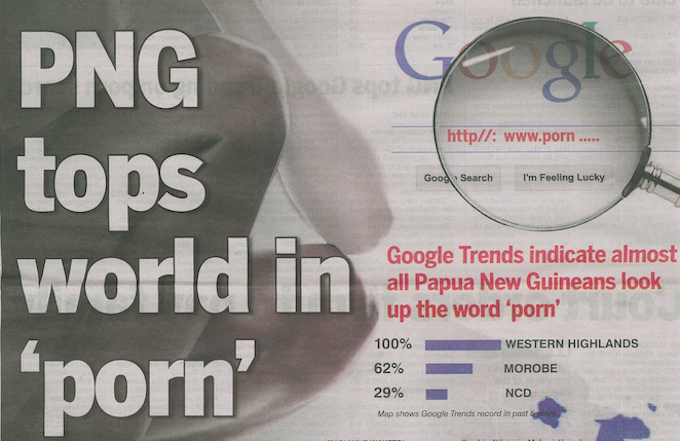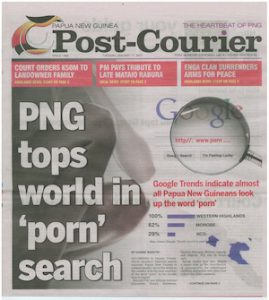
By Dr Amanda Watson
PORT MORESBY (DevPolicyBlog/Asia Pacific Report/Pacific Media Watch): In Papua New Guinea, the Post-Courier featured a front-page story with the headline “PNG tops world in ‘porn’ search” on January 17. In previous years, there have also been similar stories asserting that PNG beats all other countries when it comes to internet searches for pornography.
 For any nation, this accolade would be unwelcome. As PNG prides itself on being a Christian country with strong traditional cultures and values, coupled with tough laws banning importation of pornographic magazines and movies, the headline has produced consternation.
For any nation, this accolade would be unwelcome. As PNG prides itself on being a Christian country with strong traditional cultures and values, coupled with tough laws banning importation of pornographic magazines and movies, the headline has produced consternation.
The ruling political party in PNG has released a statement and the competing newspaper has also published a response. Both reactions argue that the Post-Courier’s front page story is inaccurate.
The front-page article included the assertion that 100 percent of all internet searches in Western Highlands Province are for the term ‘porn’. Clearly, not every internet search in that province includes this term.
So, what is going on? My blog examines the source of the newspaper story and assesses its credibility. It also discusses internet access trends in PNG.
Amanda H A Watson is a lecturer in Public Policy at the University of Papua New Guinea (UPNG), based in Port Moresby under the UPNG-ANU partnership. She is also a visiting fellow with the State, Society and Governance in Melanesia Program at the Australian National University (ANU). This article was first published on the Development Policy Centre’s blog DevPolicy and is republished here with permission.
This work is licensed under a Creative Commons Attribution-NonCommercial 3




